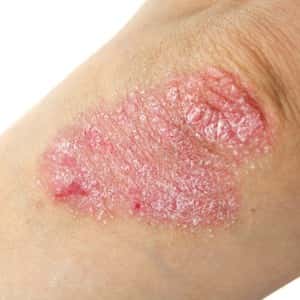
Psoriasis is a chronic skin problem in which the immune system makes skin cells turn over much faster than normal. The result is frequently red, itchy patches on elbows, knees, scalp or other areas of the body. They may be covered with silvery scales-the dead skin cells that have not had a chance to fall off normally. Drugs to treat psoriasis are often effective, but many are pricey and they can also have serious side effects. We were intrigued to hear about the results one reader got taking biotin and resveratrol for psoriasis.
Clearing Psoriasis with Biotin and Resveratrol:
Q. I have suffered from moderate to severe plaque psoriasis for more than 40 years. I have tried every possible remedy and medication with at best short-term success from steroid creams.
Recently I read that the vitamin biotin is good for skin, hair and nails. Biotin combined with resveratrol has completely cleared my skin of all plaques and psoriasis. (I was already taking resveratrol.) This took place over a period of about 30 to 45 days.
I have been on this regimen for more than six months with no recurrence of psoriasis whatsoever. My nails are also very strong now. I wanted to share this discovery of good fortune with others who may benefit.
Might Biotin Boost Resveratrol Response?
A. Thank you for an intriguing testimonial. We have not been able to find studies demonstrating that biotin improves psoriasis. There are other natural products that have been studied, however, including resveratrol (PLOS One, May 12, 2015), glycyrrhizin from licorice (Cellular Physiology and Biochemistry, online Feb. 12, 2015) and curcumin from turmeric (PLOS One, June 25, 2013). All of these may hold some promise in treating psoriasis.
One study found that taking oral curcumin (Meriva) improved the response to topical steroid treatments (Biomedical Research International, online May 18, 2015). Perhaps biotin improved your response to the resveratrol you were already taking.
Resveratrol is a compound found in the red skins of peanuts as well as in the purple skins of grapes. It has been extensively studied in animals and has anti-inflammatory activity (Neurobiology of Aging, Aug., 2016). Relatively few studies have considered possible side effects of resveratrol, but it seems to be well tolerated (Experimental and Therapeutic Medicine, Jan., 2016).
We will be interested in learning whether other readers get benefit from biotin and resveratrol for psoriasis. Curcumin might also offer an alternative approach for treating psoriasis, although some people develop allergic reactions to it.

